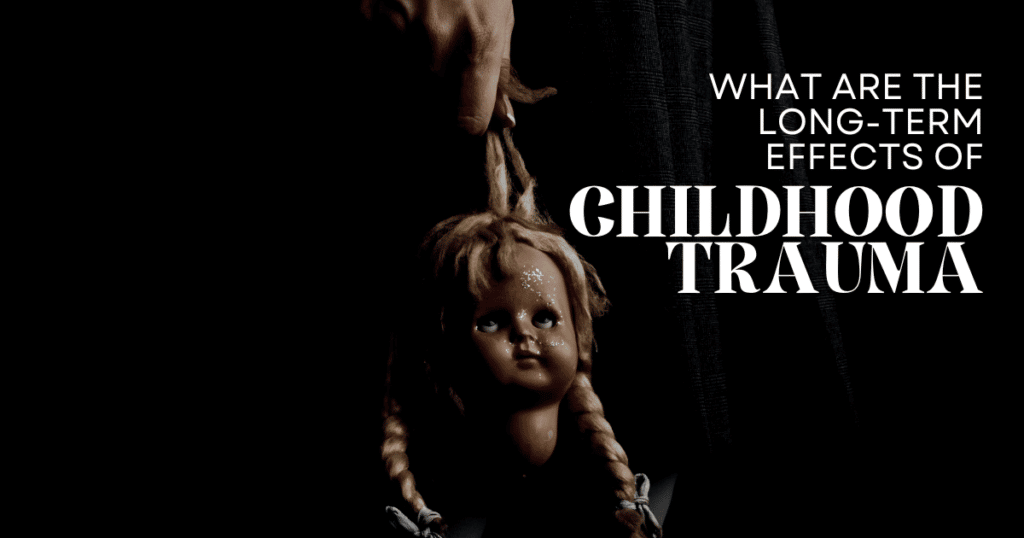The National Institute of Mental Health describes childhood trauma as the experience of events by a child that is painful or emotionally distressing, often leading to mental or physical effects. The effects of childhood trauma can last well into adulthood, but treatments are available and can help you overcome them.
What is Childhood Trauma?
Childhood trauma is when a child experiences something violent, dangerous, scary, or life-threatening. Trauma doesn’t always have to affect a child directly. For example, a child might see or hear about someone else being hurt or killed.
These events make a child feel helpless, extremely fearful and overwhelmed.
A traumatic event can cause a range of emotions, including terror and fear, loss, or distress.
Around 46% of children experience trauma or adverse experiences at some point in their early lives, and they are resilient, but that doesn’t mean these experiences can’t have lasting effects on some kids.
Sometimes, trauma during childhood is referred to as adverse childhood experiences or ACEs.
Examples oftraumatic events impacting kids include:
- Car accidents
- Loss of a loved one
- Major medical situations
- Natural disasters
Trauma doesn’t necessarily have to be a one-time event. There are also cases of ongoing traumatic exposure and stress that kids deal with.
- Living in a dangerous neighborhood with community violence or growing up in an abusive home are examples.
- Childhood trauma can also include bullying or substance abuse in the home.
- Physical abuse, domestic violence, emotional abuse, childhood sexual abuse, and chronic stress can all be examples of complex trauma scenarios.
- A parent with untreated mental health issues can also create traumatic experiences.
PTSD and Childhood Trauma
Around 15% of girls and 6% of boys develop post-traumatic stress disorder after a traumatizing event. PTSD can cause kids to re-experience the trauma in their minds repeatedly. A child might avoid things that remind them of the event, or they could re-enact it when they play.
Some children might believe they missed the warning signs that would have predicted the event. To try and prevent more trauma, in these situations, the child might become hypervigilant, constantly waiting for something bad to happen.
The signs of PTSD and trauma exposure in children include:
- Exhibiting behaviors of a younger child
- Having a hard time focusing
- Signs of anxiety or depression
- Lack of affection with other people
- Anger or aggression
- Problems at school
- Sleep disturbances
- Loss of interest in activities
- Out of touch with reality
- Appearing detached or numb
- Fears about dying young
Childhood Trauma Effects Later in Life
While children can experience the effects of childhood trauma early on, they also tend to experience them throughout their lives if they don’t get treatment.
How Trauma Affects Relationships
When we’re young, we need strong interpersonal relationships with our caregivers. We learn how to trust other people, regulate our emotions, and interact with the world around us through these early relationships.
- When we have instability or unpredictability in our relationships with our childhood caregivers, for example, when a caregiver is abusive, it affects relationships in adulthood.
- A child with traumatic experiences might have problems with friendships and romantic relationships.
- The effects of early childhood trauma can also extend to authority figures like teachers or law enforcement.
- It’s difficult for someone with unresolved trauma to be able to form a healthy relationship with anyone, including an intimate relationship until they receive treatment to heal.
- Someone could find themselves continuously in abusive relationships or avoiding relationships altogether.
Physical Effects of Childhood Trauma
When children grow up in stressful situations, their immune systems and stress response systems may not develop as they should. Then, later in adulthood, they may respond in an excessive way to stress, or they may shut down altogether.
The brain and nervous system are affected by childhood trauma. People with a history of childhood abuse or trauma may develop chronic physical health symptoms, like gastrointestinal problems or headaches in their daily life later on.
When you have trauma as a child, you’re more likely to experience many long-lasting effects on your health. There are links between high-risk behaviors like smoking and drinking, chronic diseases like high blood pressure, cardiovascular disease, cancer, and premature death.
The Impact of Childhood Trauma on Emotions
Children with trauma histories struggle to identify, express and manage their emotions. They may have unpredictable responses or explode. Some children respond by becoming numb to the world around them.
- When you experience traumatic exposure early in your life, you’re at a higher risk of developing mental disorders like depression and anxiety.
- Dissociation is also seen among the negative effects of trauma. Children learn to separate themselves from experiences mentally. They may feel like they’re detached from their body. Later in life, this might continue to be a coping mechanism, and someone with a history of trauma could appear to be “spacing out.”
- Childhood trauma exposure can lead to excessive risk-taking and high-risk behaviors like self-harm, substance use, and unsafe sex practices.
- There are impacts on cognitive and brain development that we’re increasingly learning more about through studies of children through adulthood. Stressful life events can change the structure and function of the brain.
- Adverse brain development can affect not just emotions but educational outcomes and future career opportunities.
Healing From the Effects of Childhood Trauma
There are treatment options for someone with a history of traumatic experiences. Working with a counselor or therapist experienced in this area is important.
Trauma-informed care or TIC are programs, interventions, and therapy services that help treat the symptoms or conditions stemming from traumatizing events. This type of care is based on a deep understanding of trauma’s complex impact.
Effective TIC realizes the impact of trauma and the paths for recovery. This type of care recognizes the signs and symptoms of trauma and responds by actively resisting re-traumatization. This care’s features include providing emotional and physical safety, choice and empowerment, and a focus on strength.
Types of Therapy for Trauma
Along with care being trauma-informed, some of the specific types of therapy that may be helpful to resolve the effects of early childhood trauma can include:
- Cognitive processing therapy—CPT is a subcategory of cognitive-behavioral therapy. Often the first choice for PTSD, this treatment tends to take place over 12 sessions. There is education about traumatic thoughts and emotions and then formal trauma processing. Following that, there’s skills development to help the client learn how to address their unhelpful thinking related to the traumatic events.
- Trauma-focused cognitive-behavioral therapy (TF-CBT)—this is a cognitive behavioral therapy subtype as well that incorporates interventions that are trauma-sensitive with cognitive-behavioral techniques. It can also include family support.
- Eye movement desensitization and reprocessing (EMDR)—this therapy uses repetitive eye movements to re-pattern traumatic memories.
- Narrative exposure therapy—NET is for adults and children with PTSD. It’s a short-term intervention that can help people with exposure to multiple traumatic events.
Co-Occurring Disorders
It’s very common for childhood trauma effects to lead to co-occurring mental health conditions. PTSD is one of the conditions that co-occur with trauma, as do anxiety disorders, major depressive disorder, eating disorders, and substance and alcohol use disorders. Suicidal ideation in adults may also stem from trauma, particularly sexual abuse as a child.
Effective treatment needs to address any co-occurring disorders that may exist.
If you’d like to learn about treating the effects of childhood trauma or get treatment for your teen in Southern California, reach out to the Hillside Horizon for Teens for Teens team by calling 855-746-8378




